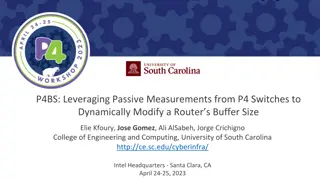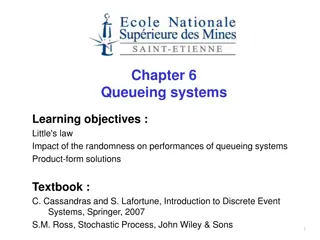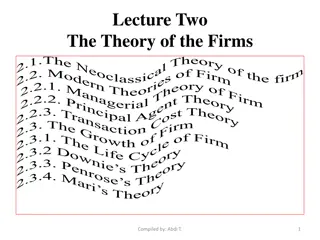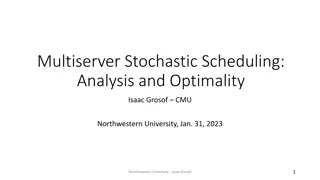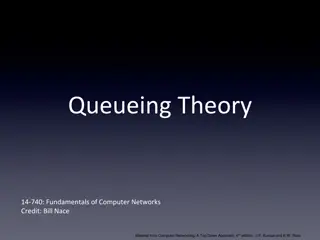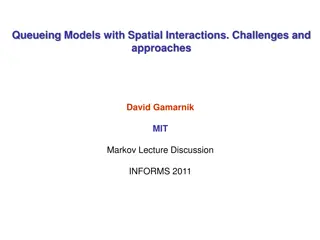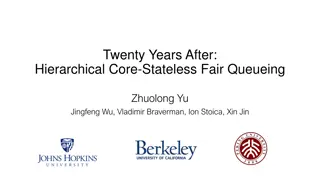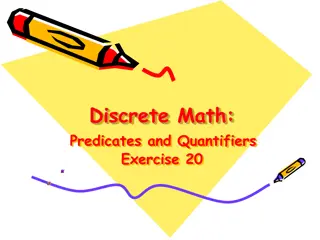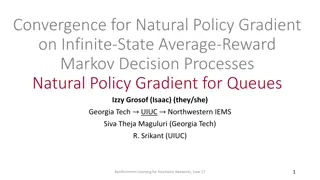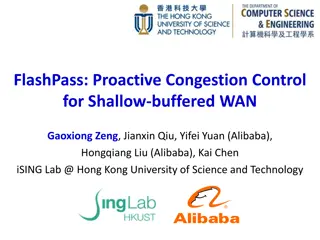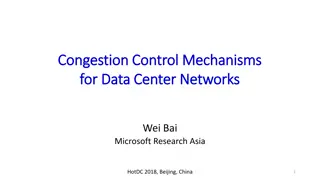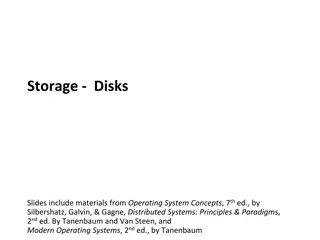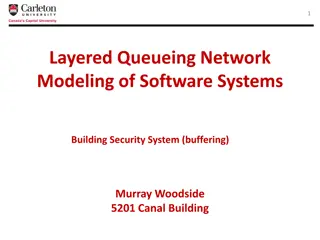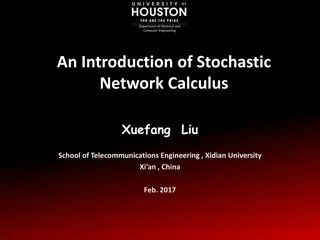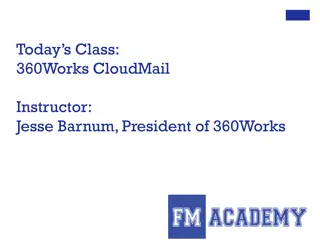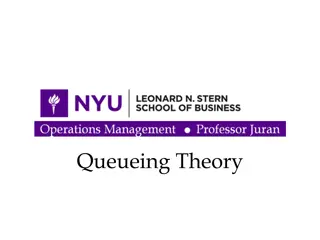System Modeling and Simulation Course Overview
This course covers the basics of systems modeling, discrete-event simulation, and computer systems performance evaluation. Topics include Monte Carlo simulation, probability models, simulation output analysis, queueing theory, and more. Professor Carey Williamson leads the course with a focus on pra
5 views • 21 slides
Dynamic Buffer Sizing using Passive Measurements from P4 Switches
This study explores the dynamic modification of router buffer sizes by leveraging passive measurements from P4 switches. By dynamically adjusting buffer sizes based on factors like the number of long flows, average round-trip time, queueing delays, and packet loss rates, network performance can be o
5 views • 14 slides
Introduction to Queueing Systems and Applications
Explore the fundamentals of queueing systems, including Little's law, impacts of randomness, and product-form solutions. Delve into the history of queueing theory and its applications in traffic control, planning, and facility dimensioning. Understand the classification and characteristics of simple
0 views • 90 slides
Evolution of Mathematical Theories and Proof Systems
Development of mathematical theories such as model theory, proof theory, set theory, recursion theory, and computational complexity is discussed, starting from historical perspectives with Dedekind and Peano to Godel's theorems, recursion theory's golden age in the 1930s, and advancements in proof t
3 views • 29 slides
Psychological Theories of Criminality: Understanding the Roots
Psychological theories of criminality delve into the association between intelligence, personality, learning, and criminal behavior. Major theories include Psychodynamic Theory by Freud, Behavioral Theory by Bandura, and Cognitive Theory by Kohlberg. These theories explore how unconscious mental pro
1 views • 20 slides
Theory of Firms: Neoclassical vs. Modern Approaches
The theory of firms is explored through the Neoclassical and Modern perspectives. Neoclassical theory focuses on profit maximization, while Modern theory delves into managerial, principal-agent, and transaction cost theories. The discussion covers criticisms of Neoclassical theory and the essential
1 views • 79 slides
Queueing Theory: Applications and Notations
Queueing theory is a mathematical study focused on predicting wait times and server configuration in systems with queues, such as telephone call centers, factories, and air travel. This theory helps in optimizing service levels and resource allocation to minimize waiting times and enhance efficiency
1 views • 32 slides
Theories of Causation in Psychological and Social Sciences
Overview of theories of causation categorized into psychological, social psychological, and sociological perspectives. Psychological theories focus on instinctive, biological, and psychological qualities of abusers, including Attachment Theory, Psychodynamic Theory, Social Learning Theory, and Situa
1 views • 15 slides
Evolution of Light Theory: From Wave Theory to Quantum Theory
At the turn of the century, the discovery of the photoelectric effect challenged the wave theory of light, leading to the development of the quantum theory by Max Planck and Albert Einstein. This new theory introduced the concept of discrete energy units known as quanta, bridging the gap between wav
2 views • 62 slides
Dp-branes, NS5-branes, U-duality, and M-Theory Overview
Overview of Dp-branes, NS5-branes, and U-duality derived from nonabelian (2,0) theory with Lie 3-algebra. Introduction to M-theory, including M2-branes and M5-branes in the strong coupling limit. Discussion on BLG theory, Lorentzian Lie 3-algebra, and the ABJM theory for M2-branes.
3 views • 32 slides
Ethical Theories: Divine Command vs. Virtue Theory Explained
Divine Command Theory asserts that morality is derived from God's commands, contrasting with Virtue Theory which focuses on developing moral virtues to achieve human flourishing and excellence. Divine Command Theory relies on religious texts, while Virtue Theory emphasizes the cultivation of virtues
0 views • 24 slides
Parent Seminars on Admission Arrangements for Nursery Classes in KGs for the 2019/20 School Year
Government-led initiatives have ushered in a new kindergarten education scheme, impacting K1 admission arrangements. Objectives include streamlining enrollment processes, reducing queueing, and aiding parents in securing timely placements. Details cover KGs involved, measures taken, and enhanced sup
0 views • 45 slides
Multiserver Stochastic Scheduling Analysis
This presentation delves into the analysis and optimality of multiserver stochastic scheduling, focusing on the theory of large-scale computing systems, queueing theory, and prior work on single-server and multiserver scheduling. It explores optimizing response time and resource efficiency in modern
0 views • 38 slides
Theories of Interest in Microeconomics II
Explore various theories of interest in economics, including the Classical Theory, Liquidity Preference Theory by Keynes, Productivity Theory, Abstinence Theory, Time-Preference Theory, Fisher's Time Preference Theory, and the Loanable Fund Theory. These theories offer different perspectives on the
2 views • 6 slides
Queueing Theory in Computer Networks
Queueing theory is a powerful analytic tool used to analyze performance in queueing processes, applicable in various industries including retail, manufacturing, and computer networks. It involves studying characteristics such as arrival patterns, service patterns, and queue disciplines to make perfo
1 views • 61 slides
Spatial Interactions in Queueing Models: Challenges and Approaches
Explore the complexities of queueing models with spatial interactions, delving into loss models, stability questions, and performance analyses. Researchers tackle the stability of systems based on job sizes and arrival rates in various scenarios. Discover insights from statistical physics and the qu
0 views • 11 slides
Core-Stateless Fair Queueing: Past, Present, and Future
Fair queueing, a fundamental mechanism for fair bandwidth allocation in networks, has evolved over the years. Core-Stateless Fair Queueing (CSFQ), proposed two decades ago, offers a stateless solution but faces challenges for widespread adoption in data centers. The need for hierarchical fair queuei
1 views • 22 slides
Predicates and Quantifiers Exercise Solutions in Discrete Mathematics
Exercise solutions involving predicates and quantifiers related to printer status, job status, and queueing in a discrete mathematical context. The solutions address scenarios like lost jobs, busy printers, queued jobs, and out-of-service printers. References to textbooks in discrete mathematics are
0 views • 4 slides
Reinforcement Learning for Queueing Systems
Natural Policy Gradient is explored as an algorithm for optimizing Markov Decision Processes in queueing systems with unknown parameters. The challenges of unknown system dynamics and policy optimization are addressed through reinforcement learning techniques such as Actor-critic and Trust Region Po
0 views • 20 slides
FlashPass: Proactive Congestion Control for Shallow-buffered WAN
FlashPass presents a proactive congestion control solution for shallow-buffered WAN, aiming to enhance network performance and achieve zero queueing, particularly in Enterprise WAN environments. The paper discusses the challenges of shallow-buffered WAN, the shortcomings of reactive congestion contr
0 views • 25 slides
Enhancing Data Center Network Performance Through Congestion Control Mechanisms
Explore the significance of low latency in data center networks and its impact on user experience and revenue. The research delves into congestion control mechanisms, network latency sources, and innovative solutions to reduce queueing delay and retransmission delay. Highlighted are the key goals, o
1 views • 41 slides
Overview of KBase and HTCondor Integration for Systems Biology Predictions
KBase is an open software platform for systems biology, offering predictive and design capabilities for biological functions. It integrates data and analytical tools for genomics research of microbes, plants, and their communities. HTCondor is chosen for fair queueing and resource limit settings due
0 views • 12 slides
Carnegie Mellon Storage Technologies
Explore the world of storage devices with the materials from renowned textbooks like Operating System Concepts and Distributed Systems. Discover the characteristics and models of storage devices such as magnetic tape, hard disk, CD-ROM, and flash memory. Delve into topics like non-volatile write, ad
0 views • 37 slides
Tackling Increasing CCA Starvation in Cloud Environments
Address the challenge of increasing CCA starvation in cloud networks caused by users selecting aggressive CCAs over vanilla ones. Learn how cloud operators can safeguard users employing vanilla CCAs through fair queueing algorithms, per-flow isolation, and ML-based CCA classification.
0 views • 15 slides
Theories of Personality: Type Theory, Trait Theory, Psychoanalytic Theory
Personality theories such as Type Theory, Trait Theory, and Psychoanalytic Theory classify personality based on various factors like body build, introversion/extroversion, enduring characteristics, and unconscious forces influencing behavior.
0 views • 13 slides
Dynamics and Queueing Networks
Uncover the dynamics of the best duo from 2014-2015 in soccer alongside insights into unlucky days. Delve into the interplay of soccer teams and queueing networks, exploring contributions, scoring assistance, and system queue times. Understand the impact of dependence among single queues in series a
1 views • 31 slides
Layered Queueing Network Modeling of Security Systems
This content discusses the modeling of software systems focusing on security aspects such as CCTV storage, door access control, and building security systems using Layered Queueing Network (LQN) examples. It covers various components and subsystems involved, along with scenarios related to door acce
0 views • 13 slides
Birth and Death Processes in Queueing Systems
Explore the dynamics of birth and death processes in queueing systems, where the number of customers changes over time due to arrivals and departures. Learn about the behavior of systems, general arrival and departure rates, and the probability of events within given time intervals. Discover the pro
0 views • 40 slides
A1 Computational Thinking
In computational thinking, recognizing patterns and abstraction play crucial roles. Generalization and abstraction involve focusing on essential characteristics, simplifying concepts for easier understanding. This process helps in problem-solving and decision-making by filtering out irrelevant detai
0 views • 8 slides
Modeling CPU-GPU Systems with Queueing Theory
Explore the effectiveness of GPGPUs in CPU-GPU systems, architectural limitations, parallelism, and mathematical modeling approaches. Delve into OpenCL models, Kuck diagrams, and queueing equations for a comprehensive understanding.
0 views • 4 slides
Understanding Packet Delay in Computer Networks
Explore the factors contributing to packet delay in computer networks, including nodal processing, queueing, transmission, and propagation. Learn through analogies like the caravan example to comprehend the concept better.
0 views • 35 slides
Time-Sensitive Networking in Communication Networks: Insights and Implementations
Explore the integration of time-sensitive networking in communication networks as discussed in the book chapter by Ulbricht, Acevedo, Fitzek, Granelli, and Seeling. Learn about IEEE802.1AS, packet shapes in IEEE802.1QAV and IEEE802.1QBV, hands-on time-sensitive queueing in Linux kernel 5.2, and more
0 views • 9 slides
Understanding Queueing Theory in System Modeling
Dive into the basics of queueing theory, exploring notation, terminology, and various queueing models. Learn how queue-based models help assess system performance efficiently and gain insights into key system properties. Discover the implicit assumptions and advanced variations of queueing models.
0 views • 20 slides
Understanding Queueing Theory and Simulation in Computing
Explore the fundamentals of queueing theory and simulation in computing, covering topics such as event-driven simulation, stochastic setting, queueing metrics, and running simulations. Learn about job arrival rates, response times, server utilization, and more to optimize system performance.
0 views • 23 slides
Advanced Analysis Framework for Queues and Processors
Explore the complex world of queueing systems, processor sharing, and threshold parallelism in this insightful analysis framework. Discover unexpected similarities and open problems in managing workload distribution efficiently across multiserver setups.
0 views • 33 slides
Networks Scheduling, Isolation, and Fairness
Learn about packet scheduling, fairness algorithms, and flow allocation techniques in computer networks. Explore concepts such as Max-Min Fairness, XCP protocol, and Weighted Fair Queueing for efficient network management. Get insights into how XCP routers compute feedback and ensure fairness among
0 views • 29 slides
Theory Construction in the Social Sciences: Understanding Components and Types
Explore the key components of theory construction in the social sciences, including the definition of theory, different types of theories, components of a theory, and the distinction between Big T and small t theories. Discover what theory is not and gain insights into the process of theory construc
0 views • 38 slides
Introduction to Stochastic Network Calculus in Electrical and Computer Engineering
Explore the world of Stochastic Network Calculus in the Department of Electrical and Computer Engineering at Xidian University. Learn about Network Calculus, Queueing Theory, and the foundations laid by R. Cruz. Discover how Deterministic and Stochastic Network Calculus provide different levels of s
0 views • 43 slides
Learn About 360Works CloudMail for Efficient Email Management
Discover how 360Works CloudMail revolutionizes email interactions using Amazon Web Services, offering features like control customization, reliability, management reporting, and high-performance email queueing. Say goodbye to ISP throttling and SMTP port blocking with this innovative solution.
0 views • 15 slides
Understanding Queueing Theory: Definitions, Models, and Applications
Explore the basics of queueing theory, including key definitions, metrics, and examples of theoretical models. Learn about Agner Krarup Erlang's contributions, components of a queuing system, customer population sources, service patterns, queue structures, balking and reneging concepts, and suggesti
0 views • 65 slides

